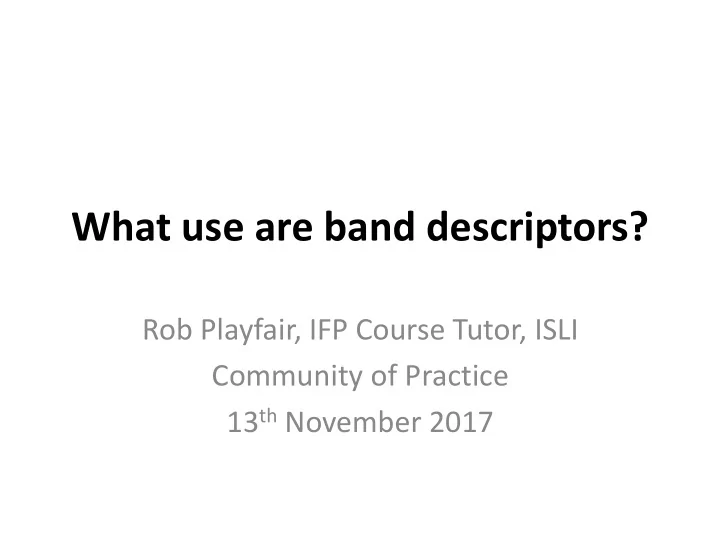

What use are band descriptors? Rob Playfair, IFP Course Tutor, ISLI Community of Practice 13 th November 2017
Purpose: to create a shared meaning Band descriptors are used to “ensure consistency in grading between one student script and the next, or between different raters .” (Alexander, Argent & Spenser) A) formative? B) reliable?
Assessing writing Tacit Knowledge: “We can know more than we can tell.” (Polanyi)
Formative: Shared meaning with students? Singapore ‘O’ Level descriptor: • C: ‘simple vocabulary and idioms mainly correct’ • B: ‘vocabulary wide and precise enough to convey intended shades of meaning’ • A: ‘vocabulary wide and precise’
Reliable: absolute judgement? List A List B 1. Stealing a towel from a 1. Testifying falsely for pay. hotel. 2. Using guns on striking 2. Keeping a dime you find on workers. the ground. 3. Poisoning a barking dog. 3. Poisoning a barking dog. (Mozer et al.)
Reliable: comparative judgement ‘First it does not define quality through prose but through exemplars. Second it does not rely on absolute judgment of tasks, but on comparisons ’ (Christodoulou)
No More Marking: Which essay is better? A B 0.85+ inter-rater reliability scores (No More Marking)
So, what use are descriptors? They can’t… Could they… • help students analyse how • provide ceilings for specific to improve. scores? • produce reliable summative • explain broadly what is and scores. what isn’t assessed? • describe the intended end goal?
References Alexander, O., Argent, S., Spencer, J. (2008) EAP Essentials , Reading: Garnet. Christodoulou, D. (2017) Making Good Progress? , Oxford: OUP Mozer, M. C. et al. (2010) Decontaminating Human Judgements by Removing Sequential Dependencies. Advances in Neural Information Processing Systems , 23. Polanyi, M. (1966) The Tacit Dimension , London: Cox & Wyman. Singapore Writing Marking Scheme (2013) No More Marking (Comparative Judgement programme): https://www.nomoremarking.com
Recommend
More recommend